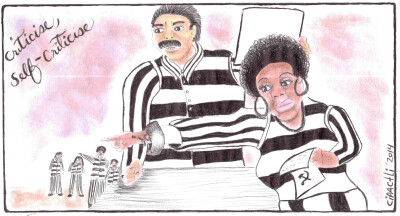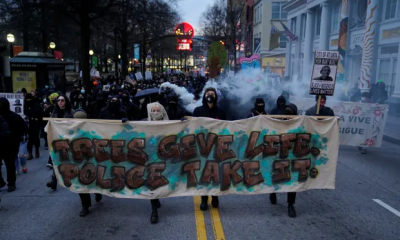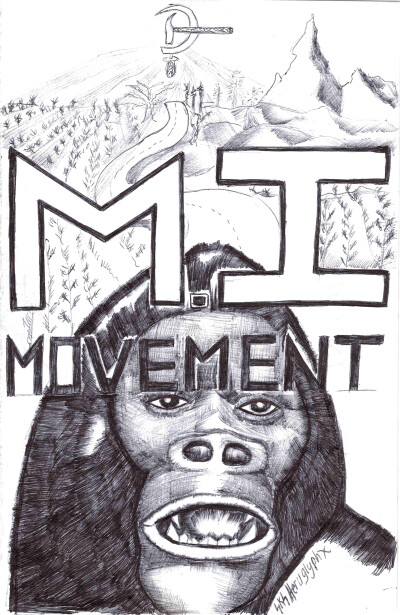
The Necessity for Revolutionary Introspection
The No. 80, Winter 2023 edition of Under Lock & Key hosted an article titled “Sacrifice Behind Bars”, wherein a comrade expressed very heavy sentiments that I intend to magnify and address from a revolutionary perspective. The details of his mention were strikingly consistent with the circumstances and characters of the North Carolina prison system enabling an apparent conclusion that our obstacles as lumpen are, indeed, collective. To that extent I consider it necessary to re-evaluate our responsibilities as revolutionaries from within; as they are comparable to our revolutionary history as Marxist-Leninist-Maoists.
The central theme of the comrade’s message can be boiled down to one question he posed: “what are you willing to sacrifice?” The comrade illustrated his legacy of sacrifice to which he is honored and should know he’s not alone in that identical regard. However, for the new-coming comrade who may not understand his conviction yet and is attracted to his energy and posture; for the seasoned comrade who may be becoming burned out; for the growing comrade who may be struggling with understanding this political line; and for the critic, we must unify on the collective understanding of why sacrifice is necessary and how to measure the particular type of sacrifice to be offered for our revolutionary objective.
The author of that article asks the question of sacrifice to comrades on the streets and comrades within alike. Demonstrating his willingness to actualize guerrilla tactics amidst similarly situated individuals who have been compromised in exchange for goods supplied by the opposition makes it apparent that a revolutionary united front is diminished in that environment, to say the least. Essential to being compromised is the viewing that an individual – or a class – is not only without, but is desperate, moralless and to whatever degree, gullible. With respect to comrade’s mention of such individuals, we should not haste into judgment nor spring into belligerence without careful and scientific observation of our own perspective. It is not sound to conclude that it is an immaculate practice of social science for the opposition to infiltrate a mind that has never operated outside of its conditioning by that opposition. “Boy they got you good” etc. is not technically true if that person is underdeveloped morally, politically, and intellectually. Even if that person is from where you are from and have been through similar experiences. If you are a conscious revolutionary – conscious in the sense that you are aware of and intuit the frame of thinking employed by Karl Marx, Vladimir Lenin and Mao Zedong – then you are unique: especially coming from capitalist-imperialist Amerikkka. That’s nothing to pride yourself on in arrogance nor egoism, its to empower your desire to fulfill your responsibilities to those unconscious. Therefore, to be ‘revolutionary’ in its most rudimentary expression is to redirect the impulses to be inhuman as you usher in humanism.
If one is morally sound, intellectually competent, and has a desire for general welfare of others, then from those perspectives that one is enriched, if he/she/they have not sequestered the abstract and subtle impetus of the capitalist-imperialist nature of his/her/their cultural (and political-economic) domicile then even with the above virtues, in those contexts, what will be is a repeat of what Karl Marx and Friedrich Engels called in The Communist Manifesto ‘reactionary socialism’; the remnants of feudal socialism. This is to the extent and in the regard of issuing counter-narratives in sole order to arouse sympathy in those who aren’t as ‘enriched’ as you to behave in a way that secures your sense of comfort. The motivations are not comparable in that example and the circumstances are as night and day by juxtapose. However, by principle and mentality its enough to say that one could be more creative from a revolutionary vantage point.
Sacrifice of any sort is rooted in the intention for a net-positive future occurrence. Therefore, the theoretical objectification of that sacrificial act bears no weight on the immediate circumstances one experiences. To add on to the comrade’s thoughts, what you are willing to sacrifice depends on your measure of awareness of what is to come of it. The knowledge of the accuracy of what is to come is based on your ability to identify with the material circumstances – emphasis on the conditions that define them – of that situation as it relates to your theory, essentially, of the world. From a revolutionary perspective ‘the world’ includes others, so when we speak of practice, i.e., sacrifice, it is necessarily unbalanced without theory.
If the masses, even in the prison setting, are viewed to be slumbering it is not for the revolutionary to wake them with a cacophony of political rhetoric, especially if their slumber is characterized by the fanaticals of capitalist production. So, we do place a high emphasis on practice. It is that practice must be guided by theory. Lenin stated:
“Without revolutionary theory there can be no revolutionary movement.” (V.I. Lenin, What is to be done?)
In his Selected Works Mao Zedong stated:
“Theoretical knowledge is acquired through practice and must then return to practice.” (Mao, On Practice: The Relation Between Knowledge and Practice, 1937)
Mao did not differ with Lenin in this regard, he magnified the principle of Lenin’s point. In real time this means to structure revolutionary practice in a manner that conveys the core principles at work in an action bound language that is interpretable to and for the observer all while being disciplined enough not to exaggerate your behavior as to make the demonstration unrealistic. The standard by which one can scale his/her/their proposed action is in one’s ability to become one with the reality of the situation; being cautious of personal biases and having rational and isolated conclusions about each component of the embodying manifest circumstance. The sum of this process is the base from which to determine what means of action to deploy. To that extent, we in prison have to be realistic without compromising our theory (i.e. political line), some of us have immense anger issues and if that is true for the proposed actor in a revolutionary demonstration then if the action to be had does require a use of force we must consider if that one is sufficient or not for the action. Use of force does not always mean complete annihilation or insurrection. Whatever is decided upon, the objective is to be clear and decisive. The actualizer must be disciplined enough to actualize the task without going too far and thereby jeopardizing the precision of the demonstration. Lenin and Mao actually had a revolution, so this frame of thinking is sound, its relevance here and now depends on our willingness to truly get with the program, i.e., Marxism-Leninism-Maoism.
The answer to the comrade’s question to the world of sacrifice, should be proportional to the details of your circumstance and the individuals and lives it would effect; from a revolutionary perspective. Only a matter of intelligence compels the conclusion that revolution is sustained by an environment prepared for it. The blaze does not come before strenuous economic, political, financial, social, cultural, and theoretical preparation. Let us take the time we DO have and align ourselves with the correct theoretical knowledge.
North Carolina IS in the building. We have recently birthed a movement – S.W.A.P. (Serving With A Purpose) – which I am proud and honored to be a founding member of. S.W.A.P. is a N.C. prisoner-led organizational base empowered by the literary guidance of MLM and in unity with the United Front for Peace in Prisons; a United Struggle from Within initiative. Our halls of learning are open for all sisters, brothers, and non-binary comrades to partake in our programs and we are dedicated to organizing with comrades abroad on the basis of theory and practice – being MLM distinguished. We currently do provide a bi-monthly newsletter called Voice of the Lumpen, by which comrades may submit articles to be published, we host a penpal mentorship program with at risk youth both in facilities and those on the streets, we provide a jailhouse lawyer legal program called “Blue Skies Legal Initiative” where comrades can learn how to utilize legal provisions in a manner that furthers our political line, and are developing more programs as time progresses.
Organize, strategize, execute!
Death to capitalist imperialism!
SWAP 1625 S. Alston Ave. Durham, NC 27707
Related Articles:










